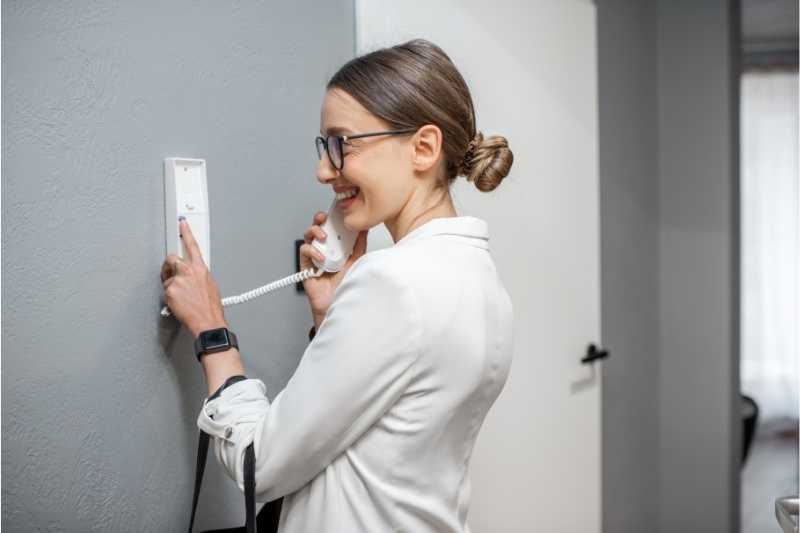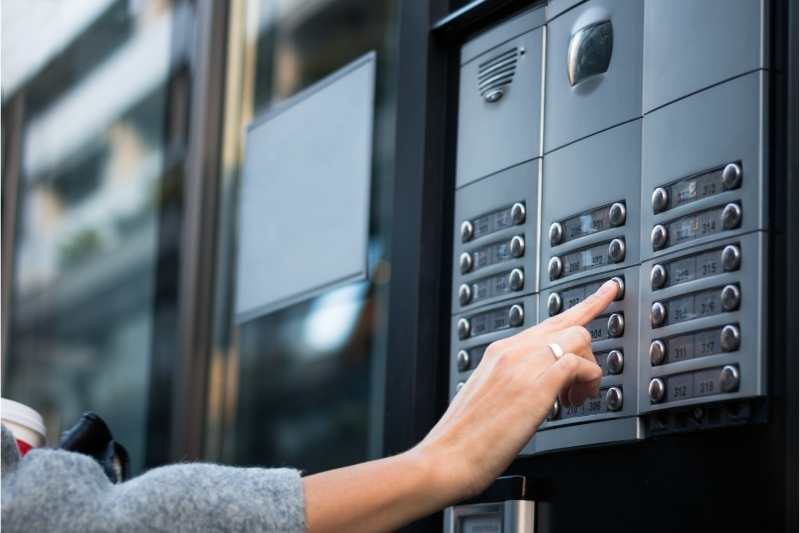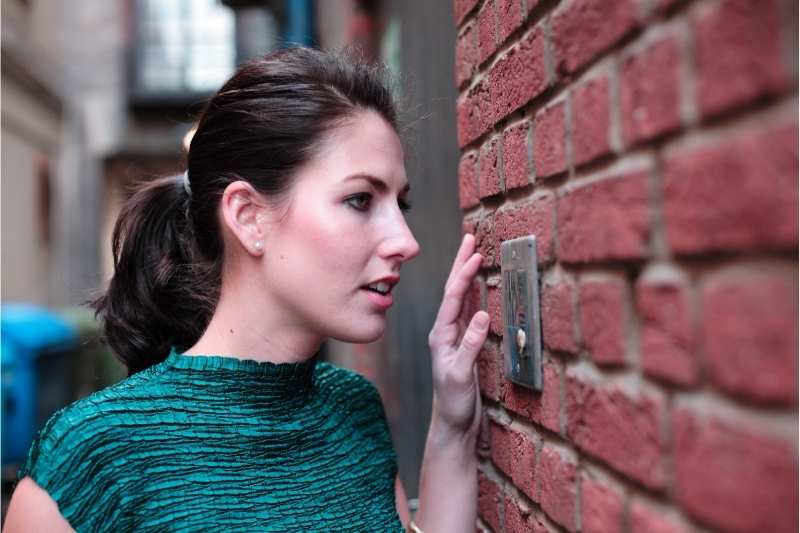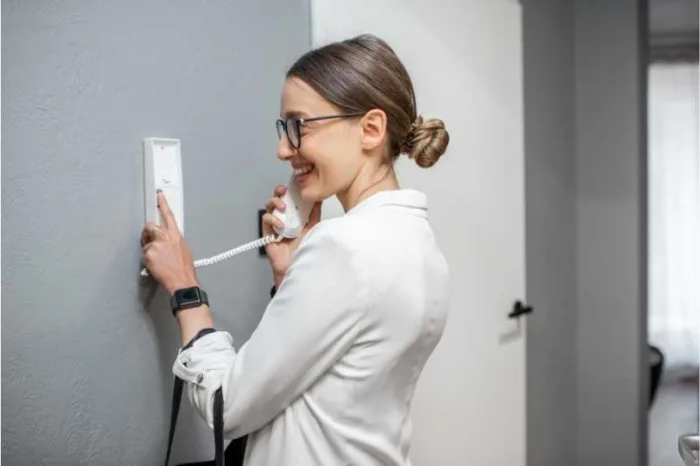Key takeaways
- IP door phones aren’t the best solution for your building’s access control needs.
- When it comes to a better alternative than door phone systems, a video intercom with a mobile app is the right choice.
- From resident satisfaction to building security and easy maintenance, smart video intercoms offer everything you’re seeking in a building entry system.

Your building’s entry system needs to be easy for residents to use while also providing high-end security features. A door phone is one common access control device that allows you to keep your entryway locked while allowing visitors to request property access. And perhaps the most advanced type of door phone entry system is the IP door phone.
If you’re considering an IP door phone for your building, it’s important to know how it works and whether it’ll benefit your property and your residents. In this post, we explain what an IP door phone is, how it works, and also its strengths and weaknesses. Lastly, we go over alternative entry systems that will better suit your property’s needs.
This post covers:
- What is an IP door phone?
- How does an IP door phone work?
- Other devices similar to IP door phone systems
- Limitations of IP door phones
- What is the best alternative to an IP door phone?
What is an IP door phone?
An IP door phone is an entry system that allows residents to speak with visitors before remotely granting them access to the building.
The ‘IP’ in IP door phone stands for “Internet Protocol.” The Internet Protocol is the set of rules that computers follow to transfer data over the internet.
So, an IP door phone uses the internet to allow residents to remotely talk to visitors and unlock the door or gate for them.
Generally, IP door phone systems are designed for multi-tenant properties, like apartments and office buildings. However, some providers have designed home IP intercom systems that work for single-family homes.
Components of an IP door phone system include:
- IP intercom base station. The system’s base station is located at the entrance to the building. It includes a microphone and speakers. Through this device, visitors can contact and communicate with residents. The base station also instructs the door to unlock when a resident grants access to their guest.
- In-unit door phones. IP door phone systems also require terminals installed in each unit. Tenants use these in-unit door phones to receive calls from visitors, talk to their visitors, and remotely unlock the door.
- Door release mechanism. The door release mechanism is the component that enables tenants to unlock the door remotely. When a tenant grants access through their in-unit terminal, the system instructs the door release mechanism to unlock the door.
Additionally, an IP door phone may also contain a camera to enable video calling between residents and visitors.
IP video door phones
IP video door phones include a camera that allows residents to see who is requesting access to the building.
Unfortunately, most IP video door phones only include a screen on the resident’s in-unit hardware, not on the intercom base station. As a result, they only provide one-way video calling, not two-way.
In other words, IP video door phones only allow tenants to see visitors — visitors can’t see tenants.
That said, the video camera is a useful feature that strengthens your building’s security. It serves as a deterrent to intruders. It also allows residents to visually confirm who’s at the door before letting them into the building

How does an IP door phone work?
An IP door phone works by allowing residents to communicate with visitors via an internet connection and remotely unlock the door for them.
As a type of intercommunication system, an IP door phone allows residents to respond to the visitor and communicate with them through audio (or possibly video if the system has a camera). Rather than sending those signals across wires, IP door phone intercom systems transmit signals via the internet.
After communicating with their visitors, tenants can then decide whether to remotely let them into the building. To unlock the door, a tenant simply pushes a button on their in-unit device. Alternatively, if it’s a modern IP door phone with a mobile app, the tenant can grant access by pressing a button on their smartphones.
In some ways, IP door phones make your residents’ lives easier. They allow residents to let package couriers, food deliveries, and service providers into the building without having to leave their units.
However, one significant drawback is that the IP door phone only acts as a visitor management system. Residents can’t use the door phone to open the door or gate for themselves.
Watch how ButterflyMX works:
Other devices similar to an IP door phone
Before we recommend the best alternative to an IP door phone (and door phone systems in general) you should know of some other options.
Some devices similar to IP door phones include:
VoIP door phones
A VoIP door phone is simply a type of door phone system that transmits audio between devices using VoIP, or “voice over internet protocol.”
The only benefit of a VoIP door phone is that you won’t need to install telephone wiring to enable residents and visitors to talk to each other.
SIP door phones
A SIP door phone is a system that uses the “session initiation protocol” to transmit data. As a result, tenants and visitors can talk to each other using an internet connection.
Some SIP door phones also offer video functionality. A SIP door phone with camera can transmit video data and make sure data syncs up with the system’s audio.
However, SIP video door phones usually only allow residents to see who’s requesting access. Most SIP video door phone systems don’t provide two-way video calling, so visitors can’t see residents.
Analog door phones
Analog door phones are essentially door phones without internet capabilities. As a result, they require extensive wiring. This makes them expensive and difficult to install.
You may encounter these a lot during your search, but they’re as basic as they come. Unfortunately, they don’t offer any additional features to enhance convenience and security at your property.

Limitations of IP door phones
Unfortunately, IP door phones lack some key features. Why go through the trouble of upgrading your building’s access control system if it won’t be as accommodating as possible?
And if you’re an installer seeking an entry system for clients, there are better systems to recommend than door phones.
Weakness of IP door phones are:
- No video. IP door phones don’t inherently include video functions. Compared to an IP video intercom, which allows residents to actually video chat with their visitors, this is a big downside.
- Not cloud-based. IP door phones aren’t inherently cloud-based. As a result, your staff may not be able to manage the system remotely and your building may require a cumbersome on-site server.
- In-unit hardware. Installing (and maintaining) door phones in each unit is a chore. Considering that other systems operate with tenants’ smartphones instead, why bother with systems that require an in-unit device in the first place?
- Minimal safety features. The lack of a visual communication method creates a serious security risk. Technology should be the primary factor when choosing a security system, and IP door phones are missing the essentials. No video recording or visitor logging is also a major red flag.
What is the best alternative to an IP door phone?
Instead of a door phone intercom system, your building needs a cloud-based video intercom with a mobile app. Cloud-based video intercoms pack in all of the features your building needs.
The biggest advantages of video intercom systems with mobile apps are:
- Smartphone-based access. All your residents need are their phones to remotely video chat with visitors and grant property access.
- Audit trail of door entries. Every tenant and guest is logged when they enter the building. Photos of each entry are stored in the cloud for added security.
- Video. IP door phones lack a camera, which means face-to-face communication between residents and guests isn’t possible. But with a smart video intercom, residents can know who’s requesting property access before letting them in.
- No in-unit hardware. No in-unit hardware means less wiring than ever — which saves you money on installation and maintenance fees.

Learn more about ButterflyMX
Fill in the form below, and we'll email you right back.
Have questions?
Fill in the form below, and we'll email you right back.





